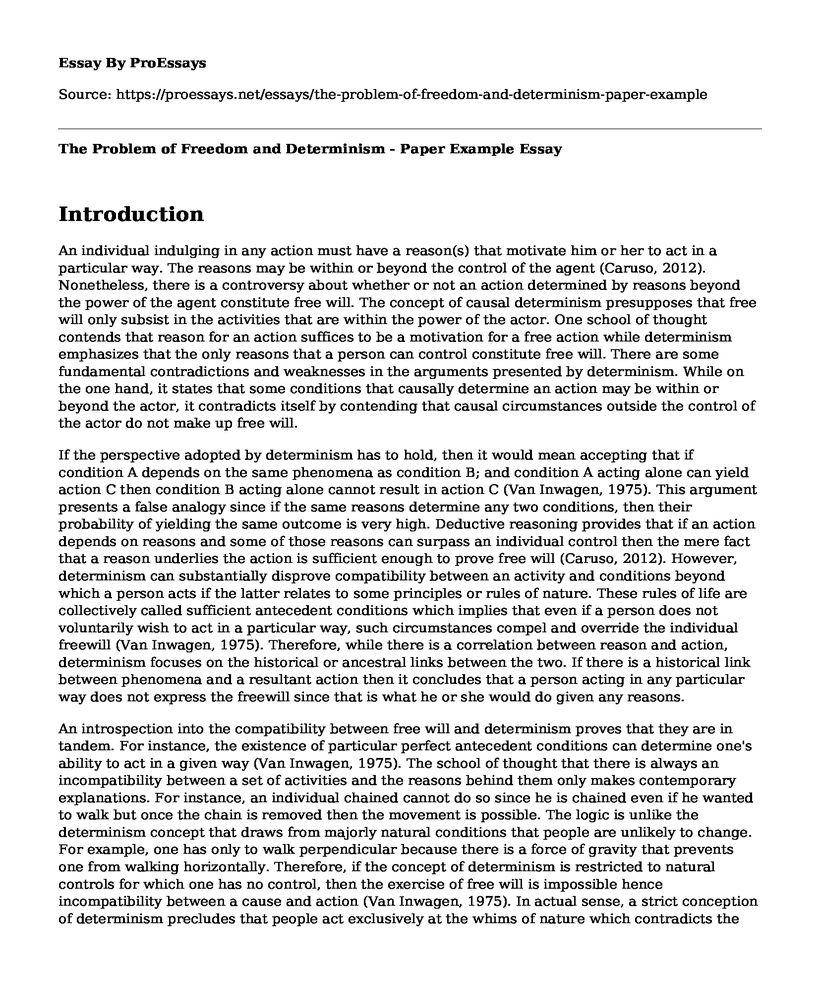Introduction
An individual indulging in any action must have a reason(s) that motivate him or her to act in a particular way. The reasons may be within or beyond the control of the agent (Caruso, 2012). Nonetheless, there is a controversy about whether or not an action determined by reasons beyond the power of the agent constitute free will. The concept of causal determinism presupposes that free will only subsist in the activities that are within the power of the actor. One school of thought contends that reason for an action suffices to be a motivation for a free action while determinism emphasizes that the only reasons that a person can control constitute free will. There are some fundamental contradictions and weaknesses in the arguments presented by determinism. While on the one hand, it states that some conditions that causally determine an action may be within or beyond the actor, it contradicts itself by contending that causal circumstances outside the control of the actor do not make up free will.
If the perspective adopted by determinism has to hold, then it would mean accepting that if condition A depends on the same phenomena as condition B; and condition A acting alone can yield action C then condition B acting alone cannot result in action C (Van Inwagen, 1975). This argument presents a false analogy since if the same reasons determine any two conditions, then their probability of yielding the same outcome is very high. Deductive reasoning provides that if an action depends on reasons and some of those reasons can surpass an individual control then the mere fact that a reason underlies the action is sufficient enough to prove free will (Caruso, 2012). However, determinism can substantially disprove compatibility between an activity and conditions beyond which a person acts if the latter relates to some principles or rules of nature. These rules of life are collectively called sufficient antecedent conditions which implies that even if a person does not voluntarily wish to act in a particular way, such circumstances compel and override the individual freewill (Van Inwagen, 1975). Therefore, while there is a correlation between reason and action, determinism focuses on the historical or ancestral links between the two. If there is a historical link between phenomena and a resultant action then it concludes that a person acting in any particular way does not express the freewill since that is what he or she would do given any reasons.
An introspection into the compatibility between free will and determinism proves that they are in tandem. For instance, the existence of particular perfect antecedent conditions can determine one's ability to act in a given way (Van Inwagen, 1975). The school of thought that there is always an incompatibility between a set of activities and the reasons behind them only makes contemporary explanations. For instance, an individual chained cannot do so since he is chained even if he wanted to walk but once the chain is removed then the movement is possible. The logic is unlike the determinism concept that draws from majorly natural conditions that people are unlikely to change. For example, one has only to walk perpendicular because there is a force of gravity that prevents one from walking horizontally. Therefore, if the concept of determinism is restricted to natural controls for which one has no control, then the exercise of free will is impossible hence incompatibility between a cause and action (Van Inwagen, 1975). In actual sense, a strict conception of determinism precludes that people act exclusively at the whims of nature which contradicts the philosophy that there are certain natural forces over which people have control and that not only natural factors determine how people act.
References
Caruso, G. D. (2012). Free will and consciousness: A determinist account of the illusion of free will. Lanham, Md: Lexington Books.
Van Inwagen, P. (1975). The incompatibility of free will and determinism. Studies, 27(3), 185-199.
Cite this page
The Problem of Freedom and Determinism - Paper Example. (2022, Aug 12). Retrieved from https://proessays.net/essays/the-problem-of-freedom-and-determinism-paper-example
If you are the original author of this essay and no longer wish to have it published on the ProEssays website, please click below to request its removal:
- Contemporary and International Issues in Business Ethics
- Ethics Issues in Social Media Research
- Paper Example on Ethics and Persuasion
- Cooperate Philanthropy Essay
- Children of Dust by Ali Eteraz Essay Example
- Law Enforcement Ethics: Integrity, Respect & Accountability - Essay Sample
- Bridging Gaps, Fostering Maturity, and Building Meaningful Relationships in Organizations - Paper Sample







